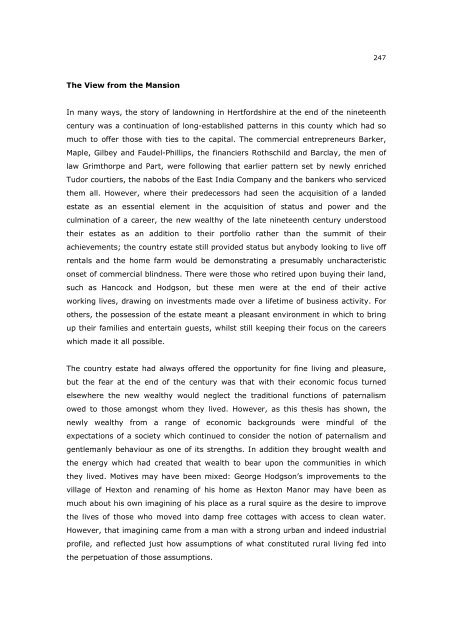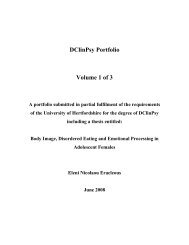- Page 1 and 2:
Julie Patricia Moore THE IMPACT OF
- Page 3 and 4:
ACKNOWLEDGEMENTS This work has been
- Page 5 and 6:
List of Tables 2.1 Population chang
- Page 7 and 8:
List of Appendices 2A Population of
- Page 9 and 10:
List of Abbreviations Newspapers an
- Page 11 and 12:
Since 1875 every kind of farm produ
- Page 13 and 14:
estate comprising more than thirty
- Page 15 and 16:
expanding population with food, and
- Page 17 and 18:
factor of the money coming in, rath
- Page 19 and 20:
London markets. 34 However, while c
- Page 21 and 22:
The arrival of the Scots was under
- Page 23 and 24:
The period 1880-1914 saw no shortag
- Page 25 and 26:
As the agricultural depression deep
- Page 27 and 28:
his obligations at Michaelmas that
- Page 29 and 30:
Relief Act, introduced in 1896, inc
- Page 31 and 32:
the anonymous urban consumer with h
- Page 33 and 34:
Flora Thompson remembered how altho
- Page 35 and 36:
Work on the land, in constant conta
- Page 37 and 38:
of the rural in the wider nation. A
- Page 39 and 40:
live upon the whole without land. H
- Page 41 and 42:
environment. This understanding exp
- Page 43 and 44:
majority of those who fought in the
- Page 45 and 46:
energy and engagement with their co
- Page 47 and 48:
that at a meeting held in May 1883,
- Page 49:
eflected that wider argument of urb
- Page 52 and 53:
Table 2.1. Population Change in Her
- Page 54 and 55:
The railway companies were alert to
- Page 56 and 57:
the small farms had quite disappear
- Page 58 and 59:
and their families were choosing to
- Page 60 and 61:
The most important of these opportu
- Page 62 and 63:
Leavesden Metropolitan Asylum for P
- Page 64 and 65:
Those who worked the farms of Hertf
- Page 66 and 67:
ecorded. However, Table 2.4 does sh
- Page 68 and 69:
work, reducing both the yield and q
- Page 70 and 71:
places in hedges, is often imperiou
- Page 72 and 73:
The Landowners of Hertfordshire Tab
- Page 74 and 75:
1795, drew attention to the large n
- Page 76 and 77:
epresentation amongst the ranks of
- Page 78 and 79:
M.P., for a price of £46,500. 117
- Page 80 and 81:
een able to maintain the estate by
- Page 82 and 83:
included the turnover of those who
- Page 84 and 85:
his tenants through the worst of th
- Page 86 and 87:
orientation and potentially ripe fo
- Page 88 and 89:
The subject of the weather was a pe
- Page 90 and 91:
from the 1879 figure. 15 As an arab
- Page 92 and 93:
Table 3.2 Percentage change in aver
- Page 94 and 95:
Committee of the Bishop’s Stortfo
- Page 96 and 97:
I have not much knowledge of farmin
- Page 98 and 99:
dislocation between those who saw f
- Page 100 and 101:
As Table 3.3 shows, whilst the wide
- Page 102 and 103:
experience of bankruptcy varied acr
- Page 104 and 105:
those cases where the death of the
- Page 106 and 107:
In 1886 Benjamin Godfrey, concerned
- Page 108 and 109:
Table 3.8 Farmers occupying 1,000 a
- Page 110 and 111:
millers and farmers. 101 He was unu
- Page 112 and 113:
county from these different extreme
- Page 114 and 115:
Table 3.10 Combined Presence of Sco
- Page 116 and 117:
eported that the average rent on an
- Page 118 and 119:
However, both Spencer and Rider Hag
- Page 120 and 121:
Bruisers should remember they must
- Page 122 and 123:
were absent at the time of the inci
- Page 124 and 125:
achieved amongst Hertfordshire farm
- Page 126 and 127:
In 1902, Rider Haggard concluded th
- Page 128 and 129:
a general hostility should be avoid
- Page 130 and 131:
found that their claim to special s
- Page 132 and 133:
agricultural labourers, but that it
- Page 134 and 135:
culture which they represented and
- Page 136 and 137:
injustice on the poor farmers: they
- Page 138 and 139:
as, ‘winter or summer he was neve
- Page 140 and 141:
hour,’ 247 but whilst the agricul
- Page 142 and 143:
landowners could provide cottages o
- Page 144 and 145:
them fell victim to bankruptcy cour
- Page 146 and 147:
the hospital and the museum, as wel
- Page 148 and 149:
household word by generous deeds sc
- Page 150 and 151:
These ‘humble folk’ had a uniqu
- Page 152 and 153:
estates in Hertfordshire reflected
- Page 154 and 155:
ut does not exhaust realities’ 38
- Page 156 and 157:
villagers who had difficulties in a
- Page 158 and 159:
getting such projects off the groun
- Page 160 and 161:
invited Fillingham to visit his own
- Page 162 and 163:
Spencer and a local orchid nurserym
- Page 164 and 165:
As Table 4.2 shows, it was those su
- Page 166 and 167:
parish church. 104 Shepherd Cross d
- Page 168 and 169:
In recognition of his many kindly a
- Page 170 and 171:
celebrations in the village. 128 Sh
- Page 172 and 173:
one who came to Hertfordshire from
- Page 174 and 175:
mean,’ and was less likely to sel
- Page 176 and 177:
enthusiasm for a ‘Tudorbethan’
- Page 178 and 179:
No mention was made of the difficul
- Page 180 and 181:
for the cheap colony would spring u
- Page 182 and 183:
space available for more than just
- Page 184 and 185:
Table 4.3 Golf Clubs Established by
- Page 186 and 187:
nursemaids and perambulators, the h
- Page 188 and 189:
from the gates of the park to the h
- Page 190 and 191:
Chapter 5. The Political Climate of
- Page 192 and 193:
public imagination. As the Agricult
- Page 194 and 195:
served as Conservative members for
- Page 196 and 197:
The Four Divisions Table 5.2. Regis
- Page 198 and 199: prominent in the northern parishes,
- Page 200 and 201: attle grounds of the election in th
- Page 202 and 203: try and get good measures out of th
- Page 204 and 205: Panshanger, whose 10,000 acre estat
- Page 206 and 207: ecognising ‘how vitally important
- Page 208 and 209: Elector, and the Hertfordshire Merc
- Page 210 and 211: Faudel-Phillips was an excellent sp
- Page 212 and 213: situation of this metropolitan coun
- Page 214 and 215: disposition would suffice. 109 In f
- Page 216 and 217: However, Bingham-Cox, who maintaine
- Page 218 and 219: The final poll saw Bingham-Cox come
- Page 220 and 221: Whilst living within the division w
- Page 222 and 223: understood the political world arou
- Page 224 and 225: offering a model for the county whi
- Page 226 and 227: Hitchin, Fordham spoke of how ‘th
- Page 228 and 229: Conservative meeting that he had fo
- Page 230 and 231: solutions. That the Conservatives w
- Page 232 and 233: wanting to tidy his sitting-room wh
- Page 234 and 235: Those ‘scented-handkerchiefs’ p
- Page 236 and 237: toast was made to agriculture, ‘a
- Page 238 and 239: the Liberals who offered some small
- Page 240 and 241: Hunter, Junior, of Holwell Farm, Es
- Page 242 and 243: In a real sense, debates about agra
- Page 244 and 245: Chapter 6. Conclusion This thesis h
- Page 246 and 247: elsewhere in the country. 3 In her
- Page 250 and 251: When the new wealthy re-modelled th
- Page 252 and 253: The View from the Villa Whilst the
- Page 254 and 255: farmers to offer reliable work at r
- Page 256 and 257: workers. 24 Guides to the county co
- Page 258 and 259: Appendix 4B. Individual Public Spen
- Page 260 and 261: Status Village Halls Total 1870s 18
- Page 262 and 263: Appendix 4A Individual public spend
- Page 264 and 265: Name Occupation Place Date Amenity
- Page 266 and 267: Name Occupation Place Date Amenity
- Page 268 and 269: Name Occupation Place Date Amenity
- Page 270 and 271: Name Occupation Place Date Amenity
- Page 272 and 273: Appendix 3M Devon farmers resident
- Page 274 and 275: Appendix 3L Cornish farmers residen
- Page 276 and 277: Name Farm Parish Registration Distr
- Page 278 and 279: Name Farm Parish Registration Distr
- Page 280 and 281: Name Farm Parish Registration Distr
- Page 282 and 283: Appendix 3I Millers, corn merchants
- Page 284 and 285: Appendix 3H Farmers recorded as ban
- Page 286 and 287: Name Farm Situation Dual Occupation
- Page 288 and 289: Name Farm Situation Dual Occupation
- Page 290 and 291: Source: BPP LXIX.271 [C.460] (1871)
- Page 292 and 293: 292 Source: BPP LXIX.271 [C.460] (1
- Page 294 and 295: Appendix 3D Grain and Flour Importe
- Page 296 and 297: Returns of Great Britain, Tables On
- Page 298 and 299:
Appendix 3A Quantities returned and
- Page 300 and 301:
285
- Page 302 and 303:
Appendix 2H High Sheriffs of Hertfo
- Page 304 and 305:
Year of office Appendix 2G Patterns
- Page 306 and 307:
Registration District Civil Parish
- Page 308 and 309:
Registration District Civil Parish
- Page 310 and 311:
Appendix 2E Businessmen buying esta
- Page 312 and 313:
Owner Residence County Hertfordshir
- Page 314 and 315:
Owner Residence County Hertfordshir
- Page 316 and 317:
Rural District Parish Acreage Popul
- Page 318 and 319:
Rural District Parish Acreage Popul
- Page 320 and 321:
Registration District Civil Parish
- Page 322 and 323:
Registration District Civil Parish
- Page 324 and 325:
Appendix 2A Population of Hertfords
- Page 326 and 327:
Registration District Civil Parish
- Page 328 and 329:
PRIMARY SOURCES Archival Sources Ha
- Page 330 and 331:
BPP L.19 [401] (1882) Return of Chu
- Page 332 and 333:
Newspapers and Journals Baily’s F
- Page 334 and 335:
Forster, E.M., Howard’s End (Harm
- Page 336 and 337:
Blythe, R., Akenfield. Portrait of
- Page 338 and 339:
Fisher, R., ‘The Road Through Kin
- Page 340 and 341:
Hughes, M. V., A London Home in the
- Page 342 and 343:
Payne, C., Toil and Plenty. Images
- Page 344 and 345:
Spring, E. ‘Businessmen and Lando
- Page 346 and 347:
Unpublished PhD Theses Carpenter, A

















